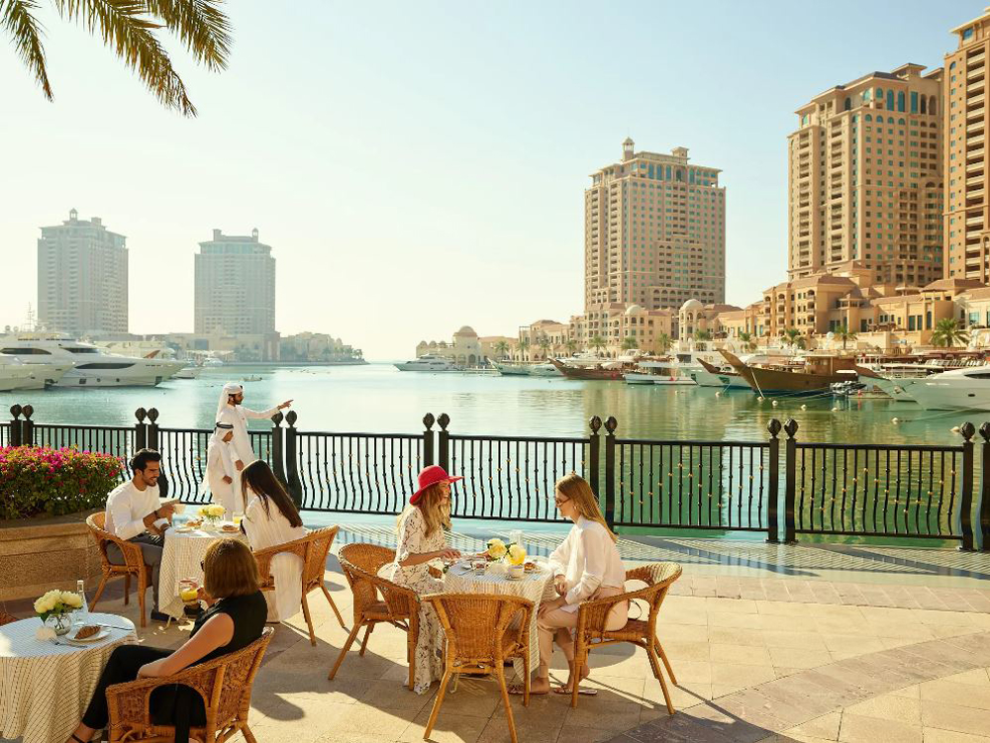Doha, Qatar: Home to people from over 100 countries, Qatar is truly a multicultural society. Its varied dining scene reflects this rich diversity, featuring an eclectic range of influences.
According to Qatar Tourism’s website (QT), Qatar’s cuisine is a delightful fusion of Arabian and Middle Eastern flavours while also embracing global influences. Whether you’re seeking fine dining, family-style restaurants, casual eateries, or cozy cafes, Qatar has it all.
Moreover, it explained that this country is a “fascinating destination for food enthusiasts, a country that walks a fine line between modernity and tradition. It presents a rich and diverse culinary scene with a plethora of choices, from Michelin-starred restaurants and experimental cuisine to delicious street food, that covers all needs and tastes.”

“The culinary experience of Qatar showcases the creative mixture of Arabic and multicultural cuisine and introduce the masterminds behind the country’s top restaurants. “
In the world of culinary, this country stands as a vibrant hub where diverse flavours from around the world converge to tantalise the taste buds of its residents and visitors alike. The dining scene in this Middle Eastern gem transcends geographical boundaries, making it a paradise for food enthusiasts.
Whether your palate yearns for the delicate intricacies of authentic Japanese cuisine, the fiery spices of India and Thailand, the wholesome richness of Mediterranean fare, the aromatic allure of Arabic dishes, or the eclectic tapestry of Asian flavours, Qatar’s culinary landscape has it all. In the heart of Doha, the capital city, a gastronomic adventure awaits, promising to satiate your cravings for global tastes, whether you are in the traditional marketplace, Souq Waqif, the streets of Doha, or event at the hotels, Doha has it all.

For aficionados of Asian gastronomy, Qatar offers a spectrum of options that range from humble noodle bowls served at bustling street vendors to opulent fine-dining establishments that artfully blend Eastern influences into their culinary creations. From the umami-rich depths of miso to the sizzle of teppanyaki grills, the Asian food scene in Qatar is an exploration of diversity.
Arabic cuisine aficionados are equally pampered in Qatar. The country boasts a captivating array of Arabic restaurants, from the atmospheric Souq Waqif with its traditional marketplace charm to the charming Souq Wakra and the hidden gems scattered throughout the country’s streets. Each dining experience promises an authentic immersion into the flavours and traditions of the region.
But Qatar’s culinary allure doesn’t stop there. Beyond Middle Eastern and Asian flavours, the country’s food scene extends to embrace international cuisine with open arms. Local and international restaurants cater to global palates, ensuring that every culinary desire, from the familiar to the exotic, is effortlessly fulfilled.
In Qatar, dining isn’t just a meal; it’s a journey through a world of flavours, a testament to the country’s cosmopolitan spirit and its commitment to celebrating the art of food from every corner of the globe. So, whether you’re a seasoned foodie or simply seeking a new gastronomic adventure, Doha and the culinary tapestry of Qatar await you.
Exploring Qatar’s street food scene
Qatar Tourism suggests that to truly understand Qatar’s culture and history, one should explore its street food offerings.
“Qatar is serious about its food, from Michelin-starred to quick bites, and the annual Qatar International Food Festival (QIFF) is a foodie’s dream. Held in the great outdoors during Qatar’s wonderful spring, QIFF serves up culinary experiences, including street foods from around the world,” it said.
QIFF is the country’s biggest culinary celebration, which also presents various workshops and daily entertainment for the whole family, along with live cooking classes by award-winning chefs. Qatar Tourism is yet to announce when and where is the 13th edition be taking place.
“While Qatar’s street food isn’t typically sold on roadside stands or carts, refurbished shipping containers in “box parks” are local interpretations, offering a variety of favourite food and drink, including the nation’s favourite specialty coffees and karak tea,” QT explained.
Here are six must-try street foods in Qatar:
1Poori or Chapati: These crispy flatbreads come with a choice of savory and sweet fillings, making them a perfect pair with karak tea. “An offshoot of the Indian paratha, poori or chapati are flatbreads with a crispy crust. They can be eaten plain or rolled around a choice of savoury and sweet fillings from cheese and mince-meat to honey and Nutella.”
2 Shawarma: A Middle Eastern favourite, shawarma features boneless strips of chicken or beef, grilled and served in various bread types with sauce, pickles, and sometimes fries. “As the meat cooks, its crispy edges are sliced and wrapped in bread along with sauce, pickles and often, fries. The bread varies from thick round buns to flat pita breads to Arabic ghubuz or paper thin saj, depending on whether it is Lebanese, Turkish, Syrian or the generic “Arabic” variety.”
3 Falafel: These vegan-friendly deep-fried balls or cutlets are made from chickpeas or fava beans, mixed with garlic, parsley, coriander, and tahini. “Mixed in with garlic, parsley, coriander and tahini, these fried dumplings can be enjoyed on their own or in pita pockets along with salad and pickles.”
4 Ragag: These paper-thin crepes are crispy and versatile, served with various toppings, from cheese and eggs to honey and fish paste. “Best eaten hot with tea, with kebabs or slathered with toppings such as cheese, eggs, honey and mhyawa (a thick fish paste) that can be spread on top while the bread cooks.”
5 Samosa: Qatar’s version of stuffed fried dumplings comes in both large and small varieties, filled with mincemeat, spinach, or cheese. “While the South Asian version – samosa – is bigger, with a thick crust and potato filling, its Arabic counterpart is smaller, with thin crusts stuffed with mincemeat, spinach, or cheese. Served with a variety of chutneys, these little flavour pockets are served as an accompaniment to evening tea or as a starter.”
6 Lokma or luqaimat: These sweet flour dumplings soaked in sugar syrup are a local dessert favourite, featuring warm, gooey centers. “Locals claim it’s hard to stop once you start, and this dessert is a must-have during Ramadan.”
Source : ThePeninsulaQatar




































